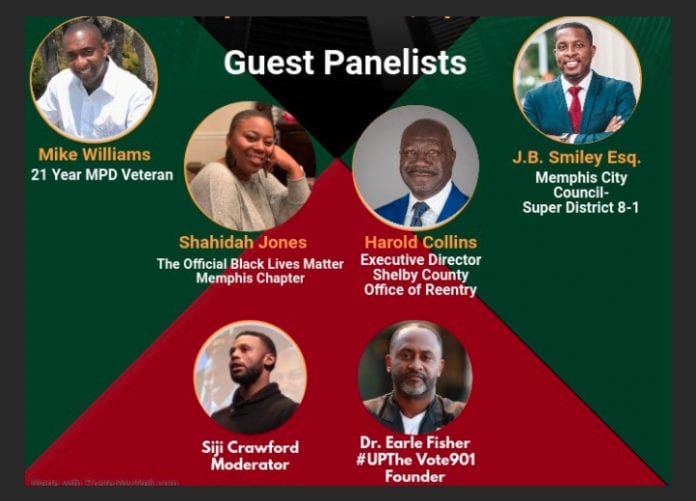More police officers are not the answer to combat crime in Memphis and Shelby County.
That was the consensus of panel members at UPtheVote901’s Crime and Public Safety Symposium Monday (Sept. 14). The unanimity was short-lived, however, as panel members soon clashed on other topics related to local police reform.
The panel, composed of a group of elected officials, law enforcement and activists focused on key issues that have been at the forefront of reform talks in Memphis and Shelby County – police defunding, transparency in law enforcement reporting and the need for more or fewer police officers.
Panel members included: Memphis City Councilman JB Smiley; Harold Collins, executive director of Shelby County Office of Re-entry; Shahidah Jones, Official Black Lives Matter, Memphis Chapter, and retired Memphis Police Department veteran Mike Williams, who recently announced his retirement as president of the Memphis Police Association.
UPtheVote901 leader Sijuwola Crawford moderated the discussion.
The symposium comes on the heels of three failed police reform ordinances proposed by some Shelby County commissioners Monday.
One ordinance would prevent the Shelby County Sheriff’s Office from hiring officers with a history of excessive force.
The other would limit the department’s use of chemicals, such as tear gas.
The third ordinance would require the Sheriff’s Office to get the commission’s approval before purchasing military-grade weapons.
Although the proposed ordinances failed to get a majority vote, they still will advance to a second reading at the next commission meeting.
Previously, in another effort to move the needle on police reform, Memphis Mayor Jim Strickland announced the formation of a citizen advisory committee earlier this month. The goal of the 13-member team is to help “re-imagine the Memphis Police Department.”
UPtheVote901 founder, the Rev. Dr. Earle J. Fisher, who hosted the symposium, has said he’s not confident in Strickland’s committee because of a lack of diversity in opinion among committee members.
“We deeply believe that a better electorate is one that will turn out and yield more participation,” Fisher said, explaining one of the reasons his nonpartisan voting and political activism organization decided to host the event.
Police reform has steadily become a hot button issue nationally and locally following the death of George Floyd at the hands of Minneapolis police officers in May.
While the panel agreed that more officers would not necessarily curb local crime, they disagreed on other topics. One of the biggest disputes involved defunding the police.
Williams, who served on the Memphis Police Department for more than two decades, said he does not support taking funds from local law enforcement.
“I don’t believe that police are the only answer; they are just a piece of the puzzle. But we need to make sure we have enough to be in a proactive role as opposed to a reactive role,” he said.
“There are good citizens and there are those who are operating outside of the law… and those issues have to be addressed.”
Strickland has said the city needs at least 800 more officers to meet its staffing goal.
Smiley has publicly disagreed with that stance.
“We are fine with the number we have now and any increase needs to go to funding communities,” he reiterated at the symposium.
Jones agreed, providing clarity on the now nationally popularized and controversial phrase “defund the police.”
“This is a term that talks about defunding in dollars and in power,” she said. “It is saying we want to put more funds and power in the hands of our community.”
Approximately 40 percent of the city’s budget goes toward policing.
Collins said taking away from the department isn’t the answer.
“Once you talk about defunding the police, you talk about cuts that may include closing precincts, and no one wants that,” he said. “But there are grants and other resources that can be reallocated to fund some of the other things.”
While their differences were abundant, all panel members pointed to the need for crucial conversations such as Monday’s.
Williams, added, “As a Black man in America, I never want my brothers and sisters to be mistreated by police. So, I get what the activism and conversation is about, but there needs to be a 360 conversation, and I’m willing to do that.”
In a slightly heated exchange, Smiley challenged Williams’ comment, claiming that his office reached out to the soon-to-retire police association president to set up a meeting to discuss reform, but received no reply.
Williams countered that he didn’t recall seeing Smiley’s email.
After the conversations, like the one at the symposium, what’s next?
Smiley said the next steps should include elected officials devising a public safety plan, similar to the comprehensive plan of Memphis 3.0. This proposed plan would include allocating resources to communities in need, supporting wrap around services and community policing.
“We can’t fix this problem with a single-faceted approach that only gives the appearance of safety without providing results,” he said.
As for UPtheVote901 organizers, they plan to keep the conversations going, hoping to stimulate change toward police reform and other issues they say matter to residents.
“This is not the end of our conversation. This is part of a broader, structural and systemic and holistic framework that we hope to implement (over) the next few years,” Fisher said.
The next UPtheVote 901symposium will take place in October and will focus on labor and wages.




